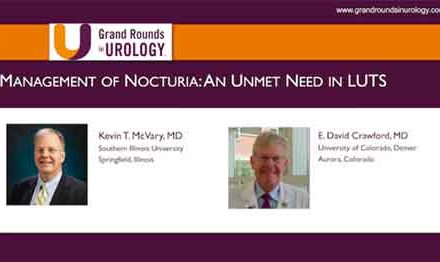Neil H. Baum, MD, presented “Optimizing the Diagnosis and Management of Nocturia” during the 24th Annual Innovations in Urologic Practice on September 14, 2019 in Santa Fe, New Mexico.
How to cite: Baum, Neil H. “Optimizing the Diagnosis and Management of Nocturia” September 14, 2019. Accessed Feb 2026. https://grandroundsinurology.com/optimizing-the-diagnosis-and-management-of-nocturia/
Optimizing the Diagnosis and Management of Nocturia – Summary:
Neil H. Baum, MD, discusses the frequency and danger of falls and fractures in older Americans, noting that nocturia is a major cause. He emphasizes the important role urologists play in screening patients for falls, and explains the multifactorial nature of nocturia and corresponding treatment options, as well as how to manage patients’ comorbidities.
Abstract:
Falls and fractures constitute a major risk for older Americans. In fact, one in four Americans aged 65 and older fall each year, and these falls cause approximately 30,000 deaths annually. Nocturia, or waking to void two or more times per night, is the leading factor of nighttime falls and fractures. Urologists, therefore, have a unique responsibility to proactively reduce falls and fractures.
One of the most important ways urologists can help prevent falls is by asking patients if they are having them. Fewer than 50% of elderly people experiencing falls will mention them to their doctor. It is likely that many of the patients that urologists are already treating experience falls on a regular basis but do not inform their doctor.
Urologists can screen patients by looking for a history of falls, as well as signs of agitation, visual impairment, and transfer or mobility problems. Once the urologist determines that a patient is suffering from falls, they should report this to the primary care physician and other medical experts working with the patient to help make sure their comorbid conditions are accounted for in making their environments as low-risk as possible. Simply identifying the problem saves lives.
Urologists can also help prevent falls by treating the risk factor of nocturia. Nocturia is multifactorial, with causes ranging from polyuria to overactive bladder to bladder outlet obstruction and beyond, and treatment varies depending on the cause. Urologists should focus on identifying the cause of a patient’s nocturia, and should then look to decrease urine production, increase bladder capacity, and/or improve emptying. This may be achieved by a variety of medications and behavior modifications. Ultimately, the treatment of nocturia is paramount for mitigating the serious risk of falls and fractures.
About the 24th Annual Innovations in Urologic Practice
Innovations in Urologic Practice (Innovations) is an annual, multi-day, CME-accredited conference devoted to innovative diagnostic and treatment strategies for and controversies related to some of the most common urologic problems in the current era. The topics covered include oncological management of the bladder, kidney, and prostate. The conference also emphasizes general urology topics in pelvic reconstruction and trauma, men’s health, and infections in the urology patient. Dr. Baum presented this lecture during the 24th Innovations in 2019. Please visit this page in order to register for future Innovations meetings.
ABOUT THE AUTHOR
Neil H. Baum, MD, is a Clinical Professor of Urology at Tulane Medical School in New Orleans, Louisiana. Dr. Baum also serves as the Medical Advisor to Vanguard Communications Group. His areas of expertise are practice management, ethical marketing for medical professionals, social media, telemedicine, and enhancing practice productivity.





